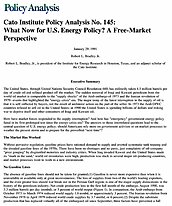How have market forces responded to the supply interruption? And how has “emergency” government energy policy fared in its first prolonged test since the energy-crisis era? The answers to those interrelated questions lead to the central question of U.S. energy policy: should Americans rely more on government activism or on market processes to weather the present storm and to prepare for the proverbial “next time”?
What Now for U.S. Energy Policy? A Free-Market Perspective
The United States, through United Nations Security Council Resolution 660, has militarily taken 4.5 million barrels per day of crude oil and refined product off the market. The sudden removal of Iraqi and Kuwaiti petroleum from the world oil market is comparable to the “supply shocks” of the Arab embargo of 1973 and the Iranian revolution of 1979–events that highlighted the “energy-crisis” era. The major irony of the latest interruption in the supply of oil is that it is self-inflicted by buyers, not the result of unilateral action on the part of the seller. In 1973 the Arab OPEC countries refused to sell oil to the United States; in 1990 the United States is spending billions of dollars and risking war to deprive itself and other consumers of Iraqi and Kuwaiti oil.

This work is licensed under a Creative Commons Attribution-NonCommercial-ShareAlike 4.0 International License.

